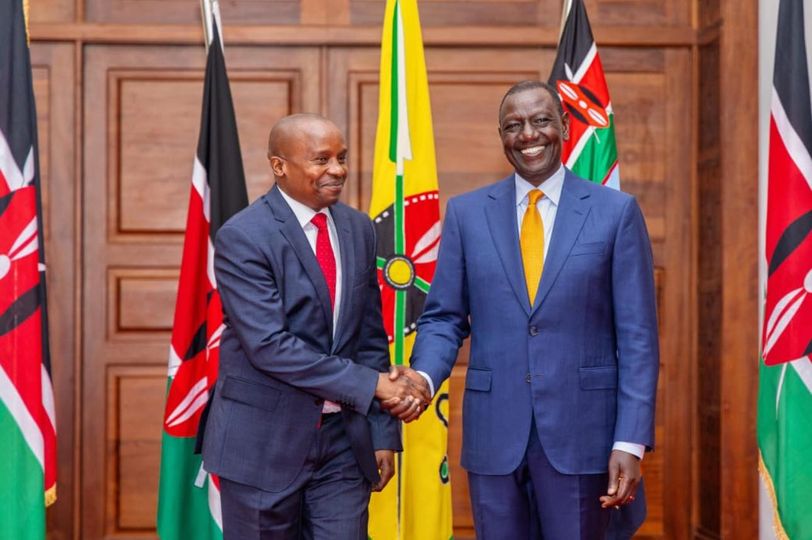By Mwanaharusi Rashid.
Interior cabinet secretary Kithure Kindiki’s ascension to the position of Kenya’s deputy president has been gazetted by the speaker of the national assembly, Moses Wetangula.
The development on Friday, October 18, came after an intense few days of legal and political wrangling, coupled by a dramatic High Court injunction that threatens to derail the process.
“It is notified that pursuant to Article 149 (1) as read together with Article 122 of the Constitution of Kenya, National Assembly has at its sitting held on Friday,18th October ,2024 in the National Assembly chamber at Parliament Building voted in favor of the nomination,” the gazette notice read.
Wetangula’s notice follows the resounding approval of Kindiki’s nomination by a majority of members of the National Assembly.
In a special sitting, 236 lawmakers backed Kindiki to replace the embattled former deputy president Rigathi Gachagua, marking a decisive step toward filling the deputy president’s office, which is vacant since Gachagua’s impeachment on Thursday 17 October 2024.
Notably, there were no objections or abstentions during the vote, underscoring broad political support for Kindiki.
However, the swift government action has been overshadowed by a legal bombshell.
Hours after the vote, High Court Justice Chacha Mwita issued a conservatory order suspending the appointment.
The injunction was granted in response to a petition filed by Gachagua and 3 others who challenged his impeachment and the subsequent nomination of his successor.
Mwita’s ruling halted all proceedings related to Kindiki’s formal appointment until October 24, when the matter will be mentioned before a specially appointed bench.
In his ruling, Justice Mwita acknowledged that the issues raised by Gachagua’s legal team held substantial merit. The pleadings and affidavits presented, the judge said, brought up questions of law and public interest that needed to be examined thoroughly.
Mwita’s decision to issue the injunction reflects the seriousness of Gachagua’s arguments, temporarily stalling the otherwise fast-moving process of appointing a new deputy president.
“That due the significance of issues raised in the petition and application, I certify this matter as raising substantial questions of law and public interest and therefore fit to be heard by a bench of uneven number of judges to be appointed by the Hon. The Chief Justice. The file be placed before the Hon. Chief Justice immediately for consideration in that regard,” the ruling read.
Justice Mwita, acknowledging the public interest in the matter, emphasized that the case raised critical constitutional issues that could set precedent, and that given the importance of the petition and its implications, it is only right that the matter be handled with the gravity it deserves adding that a multi-judge bench would be better suited to handle the legal complexities of the case.
As the legal battle intensifies, political commentators have pointed to Gachagua’s court challenge as a desperate bid to regain control after his ouster. Gachagua’s lawyers argue that his impeachment was procedurally flawed, and as a result, his removal from office should be declared null and void.
The legal team has also questioned the speed with which the nomination process to fill the position of deputy president proceeded, alleging that it was orchestrated to undermine the former deputy’s right to a fair hearing.
The injunction puts on hold the entire process, including President William Ruto’s next steps. After the parliamentary vote, Ruto was expected to formally appoint Kindiki as deputy president, a move that would be followed by the oath of office.
However, the court order means that Kindiki’s journey to the second-highest office in the land is temporarily halted, pending the court’s resolution unless otherwise.
Gachagua maintained his innocence throughout the impeachment process, while his lawyers pledging to fight the impeachment charges with vigor, insisting that Gachagua is a victim of political machinations aimed at removing him from office unjustly.
As the country waits for the next twist in this ongoing drama, political analysts are split on the potential outcomes. Some see Gachagua’s court challenge as a long shot, predicting that Kindiki will ultimately be sworn in. Others believe the legal issues raised could delay the process further, leaving the office of the deputy president vacant for an extended period.
For now, all eyes are on the High Court and the bench of judges that will deliberate on Gachagua’s petition. Until October 24, when the case will be mentioned, the fate of Kindiki’s appointment remains in limbo, and the political landscape in Kenya continues to be a minefield of twists and turns.
The coming days will be critical as the country’s judiciary is plunged into the spotlight, tasked with resolving a high-stakes constitutional showdown that could reshape Kenya’s political future.
Will Kindiki take the oath as deputy president, or will Gachagua’s legal battle reignite his political career? Only time will tell.


